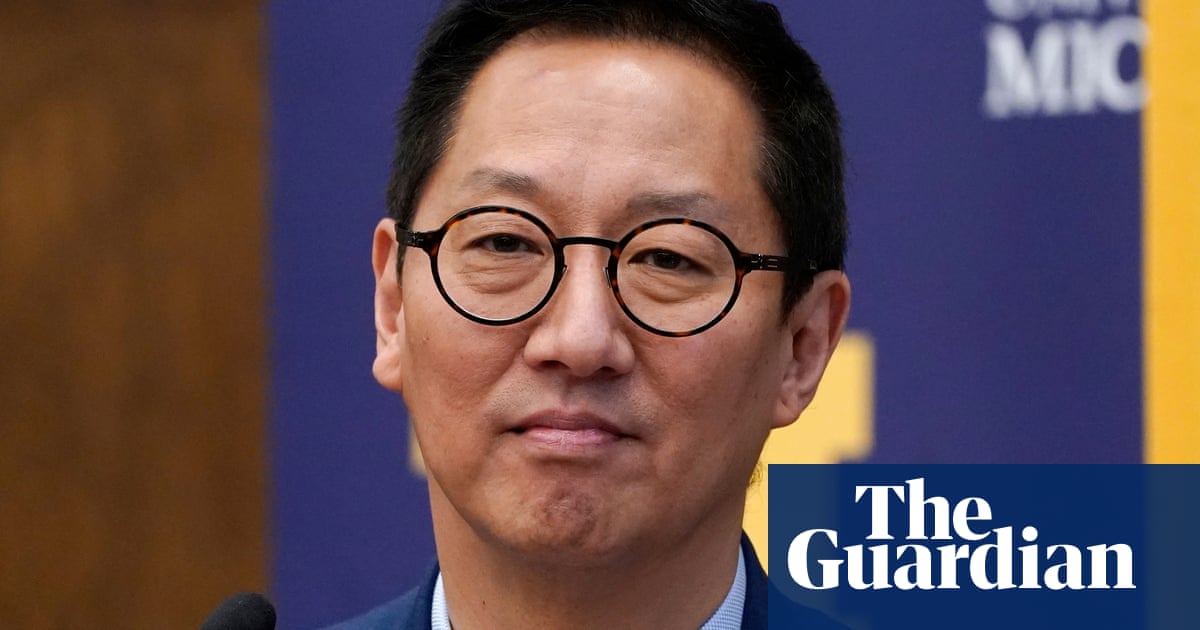Conservatives on a state college board reversed a decision to hire the experienced academic Santa Ono to lead the University of Florida, despite his efforts to distance himself from previous support for diversity, equity and inclusion (DEI) initiatives and past criticism ofDonald Trump.
The 10-6 vote followed acontentious meeting of the Florida board of governorson Tuesday when members argued over Ono’s record, including accusations he failed to protect Jewish students duringpro-Palestinian protestslast year while he was president of the University of Michigan.
The rejection came a week after UF trusteesvoted unanimouslyto appoint him as the 14th president of the state’s third-largest university at a salary of $1.5m. It also followed what some critics saw as an attempt by Ono to “clean up” his record.
His name wasquietly removedlast month from a letter signed by more than600 university presidentsaccusing the Trump administration of unprecedented interference in academic institutions. Ono wrote anopinion piece for Inside Higher Edin May explaining why he no longer believed DEI on campus represented equal opportunities for students.
“Over time, I saw how DEI became something else – more about ideology, division and bureaucracy, not student success,” Ono wrote, taking credit for eliminating university DEI offices in Michigan.
“Combating antisemitism has [also] been a priority throughout my career. I’ve worked closely with Jewish students, faculty and community leaders to ensure that campuses are places of respect, safety and inclusion for all.”
At least one governor in Tuesday’s board meeting in Tallahassee was skeptical of Ono’s shifting views.
“The public record completely contradicted what the nominee was telling us,” Paul Renner, a Republican former speaker of the Florida house, said, according to theNew York Times.
And a raft of conservative figures inFlorida, where the Republican governor, Ron DeSantis, has led an assault on what he sees as “woke ideology” on campuses, were previously critical of Ono’s nomination.
They pointed to, among other issues, Ono’s previous support for DEI efforts, and a claim he wasslow to respondto pro-Palestinian protests at the University of Michigan’s Ann Arbor campus in April and May last year. The university hassincetaken a particularly harsh approach to cracking down on the protests.
Senator Rick Scott, a former Florida governor,said on Xthat Ono was the wrong choice to lead a university he called the “gold standard” in fighting antisemitism.
“He is willing to appease and prioritize far-left activists over ensuring students are protected and receive a quality education,” Scott wrote.
“UF needs and deserves a president who will stand strong against hate, antisemitism and divisive policies and stand with our Jewish students.”
Republican Florida congressman Jimmy Patronis urged governors to reject Onoin a tweetbefore Tuesday’s meeting.
Sign up toThis Week in Trumpland
A deep dive into the policies, controversies and oddities surrounding the Trump administration
after newsletter promotion
“There’s too much smoke with Santa Ono. We need a leader, not a DEI acolyte. Leave the Ann Arbor thinking in Ann Arbor,” he wrote.
UF trustees, however, defended Ono against accusations he had changed his stance to secure the job in Gainesville.
“Dr Ono is not shifting his views to fit Florida. He has been evolving his perspective over time – before UF ever approached him about this role,” they saidin a press releaselast month.
“Like any other good scientist, Dr Ono adopted new perspectives as he gained new information.”
Mori Hosseini, chair of the UF trustees, said Ono would have ensured “that merit and scholarship, not ideology, are the gold standards for success”.
Florida’s rejection of Ono, who would have become the highest paid university president in the country, is symptomatic of the wider rightwing assault on higher education, with DEI and antisemitism allegations the primary pretexts. Trump isfeuding with Harvard, one of the country’s oldest and most respected academic institutions, over its resistance to the president’s efforts to control enrollment and curriculum.
The Trump administration revoked the visas of thousands of international students – though many have since been reinstated – and last week ordered embassies overseas tostop scheduling interviewsfor foreigners seeking to study in the US.
The Associated Press contributedreporting
